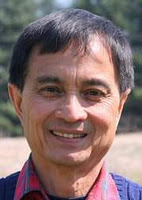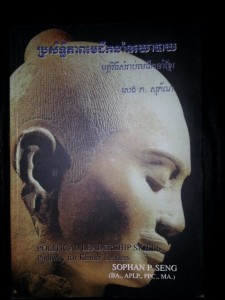A. Gaffar Peang-Meth
now browsing by tag
Sophal: her personal story telling to illustrate Cambodia politics

Dear Dr.:
In my humble opinion: may I thank you for giving me all these credits. I am certain that every body has a story…wether it is told or not, every body has one or even more than one stories….And I am very greatful for having you telling mine.Best Regards,Sophal
Written by
Gaffar Peang-Meth
My last column, in the May 31 Pacific Daily News, “Sophal is a rare voice of calm,” brought a slew of e-mails from readers who expressed admiration for Chan Sophal’s life struggle and how her story has inspired them. Readers’ emails inspired today’s follow-up on Sophal: A lesson to learn.Sophal’s parents’ cultural clashes (a passive, compassionate, tolerant Khmer Buddhist father in discord with a fiercely authoritarian, industrious, determined Chinese Confucian mother) made Sophal’s childhood less than happy. But she transformed her challenges into strength.
Through socialization, children learn values and attitudes and how to fit them into their new adult roles. Children watch, listen, imitate. In Sophal’s childhood socialization, she picked up the manners, behavior, attitudes and values from her parents — values and attitudes that were always being adapted and reinforced as she grew and passed through new experiences.
Socialization is a continuous, lifelong process.
Helped her survive
Thus what the 17-year-old 11th grader in Cambodia’s northwestern Battambang province learned, adapted and readapted helped her survive the Khmer Rouge Otaki youth camp in 1975-1979. Sophal endured hardships in the ricefields for Angkar (the Khmer Rouge Organization’s all-encompassing designation for its leader) and was “investigated” for having demonstrated an ability to write, having agreed to record for Angkar the names and personal data of her campmates, and for refusing to complain.
She politely declined offers of extra food. She upheld her Chinese mother’s teaching of the Confucian Constants, and her Khmer Buddhist father’s teaching of a person’s ability to improve.
Incredibly, Sophal and a Khmer Rouge chieftain, Mit (Comrade) Bang Rin, a thirty-something woman who left her family at age 10 to serve Angkar, developed a bond — so close and so special that Mit Bang Rin became Sophal’s protector. When Angkar ordered its troops to evacuate Otaki after Vietnam’s invasion in 1979, Sophal pleaded with Mit Bang Rin to go with her. Mit Bang Rin said she couldn’t even assure her own survival, so ordered Sophal to take care of herself. They parted in tears.
CAMBODIA: Time to get to work
CAMBODIA: Time to get to work
FOR PUBLICATION
AHRC-ETC-036-2013
October 17, 2013
An article by Dr. Gaffar Peang-Meth published by the Asian Human Rights Commission
 The more Hun Sen attempts to ignore grievances of the increasingly vocal cohort of Cambodian voters who allege election irregularities and fraud, the more the emboldened and determined opposition party demands an independent impartial joint CNRP-CPP investigation committee to seek more accurate accounting of ballots cast in the July 28th national election.
The more Hun Sen attempts to ignore grievances of the increasingly vocal cohort of Cambodian voters who allege election irregularities and fraud, the more the emboldened and determined opposition party demands an independent impartial joint CNRP-CPP investigation committee to seek more accurate accounting of ballots cast in the July 28th national election.
A metaphor seems appropriate. Imagine spectators gathering around a glass jar filled with water to watch one of Cambodians’ passtimes, chul trei krem or fish fighting. Two fish swim around, looking for one another’s weak area to attack. Gills open, fins and tails flapping, their scales turn dark colors, the fish seem to contract, poised to attack. Would it be a fight to the death or will an owner interrupt the fight to save his fish for the next fight?
The Cambodians’ political deadlock is a tragedy. There cannot be a winner. Hun Sen and his CPP know, and concerned foreign governments, too, know, the ruling party can in no way continue to govern as a one-party government and a one-party parliament devoid of opposition members who were duly elected by at least half of the country’s voters. Half of the country has openly rejected Hun Sen’s 28 years of autocratic rule and the CPP’s 34 year domination of Cambodian governance. Even many CPP partisans acknowledge that fresh leadership is overdue. In fact, reliable reports assert that increasing numbers of civil servants are unhappy with the status quo and that officers in the armed forces are overtly questioning if they are on the wrong side of history.
Hun Sen and his close associates are vehemently against an investigation committee. His reluctance is suspect if, as Hun Sen asserts, the CPP won the election fairly. Sam Rainsy is on the record as saying he would abide by the findings of a nonpartisan investigating committee. Would the true reason be that Hun Sen has no intention of ceding power? The aftermath of Cambodia’s recent election has surely made clear that Hun Sen and the CPP are no longer secure nor uncontested as they once were. More Cambodians agree it’s time for change, ph’do.
Hun Sen seems aware of his tenuous hold on power. So, on Sept 26 he spoke at his first new cabinet meeting for more than 6 hours about reforms, addressing corruption, nepotism, the rule of law and other issues. But Cambodians say Hun Sen and the CPP have made many undelivered promises before. Hun Sen’s proposed reforms may come too late.
CAMBODIA: democrats must build new leaders and focus on nation-building
CAMBODIA: democrats must build new leaders and focus on nation-building
FOR PUBLICATION
AHRC-ETC-032-2013
September 30, 2013
An article by Dr. Gaffar Peang-Meth published by the Asian Human Rights Commission
As per his usual custom, sixty-year-old King Norodom Sihamoni clasps his hands in a show of traditional Khmer respect, his face wears a ready soft and gentle smile. The king was a graceful dancer in his youth and is known never to have wanted to be king.
Buffeted by the political winds, however, on Monday, Sept 23, the king acceded to the demands of the Cambodian People’s Party leaders, who insisted that the king perform his constitutional responsibility and open the inaugural session of Cambodia’s fifth parliament despite ongoing challenges to the legitimacy of the election that gave the CPP a slim majority. The National Assembly was half empty. Only 68 of the 123 seats were occupied. Elected delegates from the opposition Cambodia National Rescue Party were 200 kilometers away at Angkor Wat, taking their own symbolic oath to be faithful to the people’s will.
Last Sept 7, tens of thousands of voters and supporters of the CNRP gathered at Freedom Park in Phnom Penh, and gathered again on Sept 15, 16, 17, carrying candles, incense, and lotus flowers, protesting alleged election irregularities and fraud that sanctioned the awarding by the CPP-appointed National Election Committee of a 13 seat advantage in the National Assembly to the CPP – 68 seats to 55 for the CNRP. Protesters endorsed CNRP’s persistent demand for an independent election probe to investigate the allegations of fraud and provide voters with “truth and justice.”
The king, who “shall reign but shall not govern” (Article 7 of Cambodia’s 1993 Constitution), was pressed to fulfill his constitutional duty to convene the first session of the National Assembly, “no later than sixty days after the election” (Art. 82), though in fact the convening could have occurred as late as September 26th, 60 days after the July 28th election.
Pandora’s Box
A Pandora’s box was opened with the king’s fateful action. Tossed aside were some half a million signatures from Cambodian citizens and Buddhist monks who were blocked from reaching the royal palace to submit cartons of petitions pleading for the king to delay the opening of the National Assembly. Also ignored was the opposition’s warning that it would boycott a parliamentary opening that occurred before CNRP-CPP talks aimed at resolving the election disputes were concluded.
The king’s action transformed the half empty assembly of 68 lawmakers from a single party into a National Assembly. A day after, on Sept 24, in an oral vote 68 CPP legislators approved Hun Sen as Prime Minister, and his new cabinet as the Royal Government of Cambodia. A royal decree formalized the events.
Increasing numbers of Cambodians have become vocal. They see the king as having disregarded the popular will which seemed to support a delay of the opening of the National Assembly. As such, these protesters assert that the king has failed two other of his constitutional roles. He does not in this instance represent a “symbol of unity and eternity of the Khmer nation” (Art.8), or to have fulfilled his “august role of arbitrator to ensure the faithful execution of public powers” (Art. 9).
Upset Cambodians also question the royal decree that installed Hun Sen as Prime Minister, as he was rejected by voters in his home province according to the CPP’s own ballot count, trailing his CNRP challenger by 104,000 votes. Nor, logic follows, should Hun Sen’s cabinet appointees have been approved to comprise the Royal Government of Cambodia for the five year term ending in 2018.












